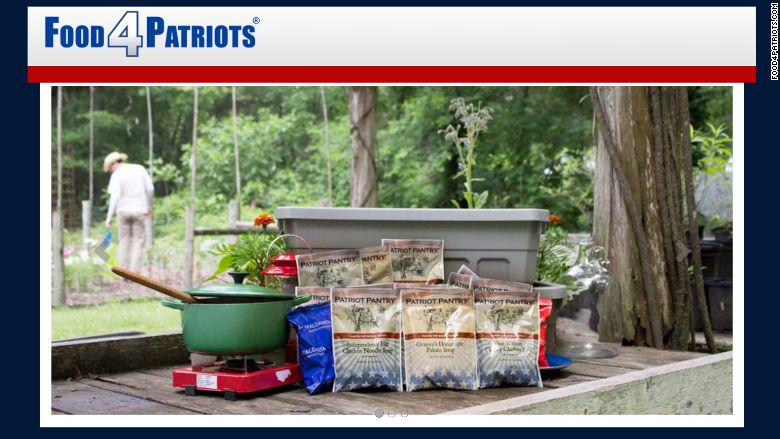
Your pick for U.S. president says a lot about you. And Rick Santorum supporters seemed like a promising place to find FEMA-fearing, apocalyptic doomsday preppers.
This week, CNNMoney explored how American presidential candidates sell your personal information.
For example, the Santorum campaign sold his donors' data to marketing companies for $36,968, according to Federal Election Commission records.
That voter profile was particularly attractive to a company that sells food kits to people preparing for global war, mass starvation and huge disasters.
Food4Patriots is a small business in Nashville, Tennessee, that sells waterproof packages of "dehydrated survival food rated to last for 25 years." A company representative, Timm Boyle, told CNNMoney the firm paid $2,295 in February to access the list of Santorum donors from the data marketing firm HSP Direct.
HSP Direct and its subsidiary, Nova List, paid Santorum for his donor lists in 2015, according to FEC records.
Companies and charity organizations typically use this type of marketing to target likely customers.
In the case of Food4Patriots, it was seeking people who'd be interested in buying survival food kits. They sound pretty tasty: There's a dried pack of chili and dumplings, a cheesy chicken rice casserole, and almond coconut granola.
Boyle explained why the company wanted Santorum's donor list.
"The majority of our customers self-identify as conservatives and supporters of conservative politicians and figures such as Santorum," he said.
But it was only a break-even investment.
"The result was OK," Boyle told CNNMoney. "The campaign yielded an increase in sales roughly equivalent to the advertising cost."
Related: Marco Rubio made half a million dollars selling his donors' data
On its website, the company claims the Federal Emergency Management Agency is trying to buy up all of its emergency food stockpile. It also warns about the looming danger of imprisonment at FEMA camps -- and a fear that President Obama will start confiscating Americans' food.
"I realize that some folks might consider that a bit paranoid," the business admits on the site.
Santorum was a regular commentator for the conspiratorial news website WorldNetDaily. As a U.S. senator in the 1990s, he voted against disaster relief funding for his home state of Pennsylvania after a massive blizzard.
Santorum's campaign didn't respond to CNNMoney's requests for comment.
There are indications that Santorum's donor list were also passed along to several other groups. After Santorum dropped out of the 2016 presidential race, his donors started receiving unsolicited emails from Senator Marco Rubio, Senator Ted Cruz, and conservative groups like Citizens United, Life Legal Defense Foundation, Black America's PAC, Veterans for a Strong America, and the Law Enforcement Legal Defense Fund.
None of those entities responded to requests for comment.
Related: Candidates use this tech to target you
Donors to other presidential candidates fit different profiles. People who donated money to the presidential campaigns of Rubio or Ohio Governor John Kasich seemed likely to support military veterans. That's why they started getting emails from the American Veterans Center.
The nonprofit's president, James C. Roberts, told CNNMoney it used a data broker to get Rubio's donor list and seek donations for a National Memorial Day parade.
According to federal records, Rubio shared his donor lists with the advertising company Campaign Solutions.
Rubio's campaign, which is now gearing up to get him re-elected to the Senate, declined to comment.
